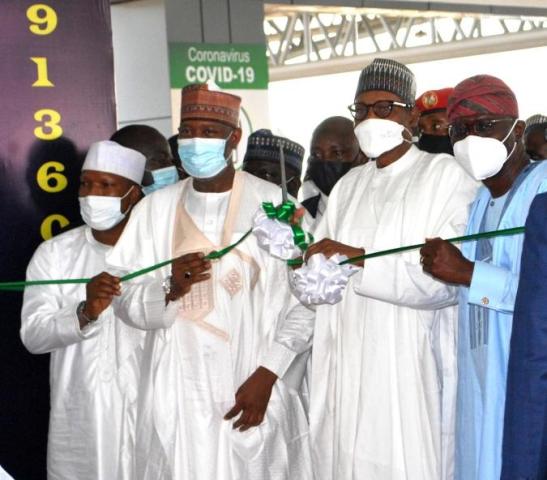
Ime Akpan
President Muhammadu Buhari has said that his administration decided to embark on the completion and delivery of five brand new international terminals at the Lagos, Port Harcourt, Enugu, Abuja and Kano airports because such infrastructure are catalysts for economic growth, foreign direct investment and development.
The president stated this on Tuesday at the commissioning of the Terminal 2 at the international wing of the Murtala Muhammed Airport, Lagos.
“Similar projects at both the Nnamdi Azikiwe International Airport and Port Harcourt International Airport were completed and commissioned by this administration and our people have since been benefiting from the positive economic impacts of those magnificent terminals.
“The one in Kano has also been completed, and will be commissioned soon, while work continues apace to complete that of Enugu shortly,” he said.
The president said the new terminal, with 66 check-in-counters, sixteen immigration desks at arrival, twenty-eight Immigration desks at departure, and eight security screening points, among others, will go a long way in contributing to the socio political and economic prosperity of our great nation.
“This improvement will increase airport operations and management services to about 14 million passengers per annum, with the attendant positive multiplier effects, by creating about 3,000 direct and indirect employment opportunities for our youths, increased inflow of foreign direct investments and exponential growth in the gross domestic product,” he said.
The president also disclosed that his administration met the airport terminals at 11 per cent completion stage as of 2015 when he became president.
He said prioritisation of aviation infrastructure aligns perfectly with the administration’s aviation roadmap, which, according to him, was developed in 2016, for the purposes of establishing critical infrastructure, including a national carrier, maintenance, repairs and overhaul centre and improved airports terminals through concession, to boost aviation practice and take the industry to the next level, reflecting global standards.
“We have also complemented these robust initiatives with specific fiscal policies to drive aviation infrastructure renaissance.
“These include the designation of 4 airports, namely Lagos, Abuja, Kano and Port Harcourt as free trade zones, in which customs duty is not applicable; removal of value added tax on all forms of shared transportation, including air transportation; and exemption of commercial aircraft and spare parts from VAT payment,” he added.
In his remarks, the minister of aviation, Mr. Hadi Sirika, said a recent aviation sector study for Nigeria by International Air Transportation Association ( IATA ) in June 2020, showcases the significant contribution of air transportation to the National economy , through providing 241,000 direct and indirect jobs and a contribution of $ 1.7 billion to the national economy.
“More so, the overall goal is to grow the aviation sectors contribution from the current 0.6 per cent to 5 per cent (approximately $ 14.166 billion).
“In the same vein, IATA projects the Air transport market in Nigeria is forecast under the “current trends” scenario to grow by 174 per cent in the next 20 years.
“This would result in an additional 9.4 billion passenger journeys by 2037. If met, this increased demand would support approximately US$ 4.7 billion of gross domestic product and almost 555,700 jobs,” he added.
Sirika disclosed that when the present administration came on board in 2015, “the aviation industry was faced with major challenges including unemployment of professionals, scarcity of foreign exchange, budgetary constraint, sustainability of waiver on aircraft and spares, decaying/ageing infrastructure and obsolete equipment, poor and intolerable conditions of airport facilities and equipment, as well as blocked airline funds.
“Consequently, he said aviation roadmap was developed in 2016 which includes national carrier, airport concession, maintenance, repair and overhaul centre, aviation leasing company, agro- allied cargo terminals, as well as aerospace university, etc.
“The roadmap projects are being undertaken through public private partnership and the ministry has been working very closely with Infrastructure Concession Regulatory Commission (CRC) to ensure we have a credible and transparent process.
“In particular, the airport concession project (including the newly commissioned terminals) has reached advanced stage,” he added.
zzzzzzzzzzzzz

























































